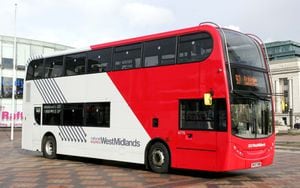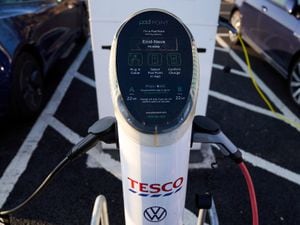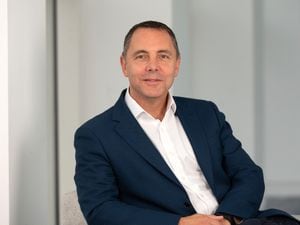Growth at home and abroad for National Express
Growth at home and abroad has boosted revenue and profit figures at public transport group National Express.

The Birmingham-based business, which runs most of the bus services across the West Midlands, said it saw growth across every division of its operations, from trains in Germany to school buses in the USA.
Despite bad weather in the US it has also seen a good start to this year, with revenues and profts up in January.
Group pre-tax profit rose 16% to £156.4 million in 2017, while revenue rose to £2.32 billion from £2.09bn the year before.
2017 also saw National Express quit the UK rail industry to concentrated on coach and bus operations, which increased revenue to £561.5m from £557.9m the year before, while operating profits rose to £70.7m from £67.3m. That came after a strong second half reversed a drop in passenger numbers in the first half of the year.
Dean Finch, National Express' chief executive, said: “I am very pleased with our performance in 2017. Strong performances in our North American and ALSA (Spanish) divisions, combined with growth in our UK businesses, have delivered significant increases in group profit, revenue and cash generation.
"We carried more passengers than we did last year reflecting the strong focus in all our businesses on good service and value for money. Our international diversity is an important asset, but it is particularly pleasing that all divisions contributed strongly to our group performance.
"The second half performances of our UK businesses were particularly impressive."
He added: “Our strategy is simple: we focus on providing well run, safe, value for money services in and around some of the most affluent cities and regions in the world. This sustainable strategy is proving to be highly successful as the proposed 10% increase in the final dividend demonstrates. I am looking forward with optimism to the coming year, which I expect once again will deliver growth in revenue, profits, cash flow and dividends.”
In his review of the year, Mr Finch said: "With the group out of UK rail we have removed both significant financial commitments and political distraction and are able to concentrate on growing our bus and coach presence in our existing, interesting adjacent and targeted new, markets.
"Rather than spending tens of millions of pounds on rail bids where we may win, say, one in four competitions – which were also won on increasingly eye-watering terms, with vanishingly thin returns – we have decided to invest our strengthening resources on improving the quality, safety and efficiency of our operations as well as on attractive acquisition opportunities. We have expanded in and into large, wealthy cities and also launched successfully in three new markets (Germany, Bahrain and Switzerland) in recent years. These three new market entries have all been profitable in their first full year of operations."
"We also continue to forge and leverage strong partnerships with local authorities to tackle key operational and customer service challenges. For example, through a joint bid with Transport for West Midlands, our bus business has recently secured Department for Transport investment for new bus lanes on the important Harborne to Birmingham city centre route.
"We have introduced our state-of-the-art Platinum buses to this route, with the aspiration of repeating the significant increases in passengers we have seen where previous schemes (such as Lode Lane in Solihull) have combined journey time savings with new, premium vehicles.
"It is precisely this strong partnership approach that we are looking to further enhance by working closely together to make sure the 2022 Commonwealth Games in Birmingham are a success and deliver significant transport improvements before the games begin."
Following the drop-off in passengers after last year's terror attacks in London and Manchester, National Express cut ticket prices on some coach services. As a result its coaches carried more passengers in 2017 than in 2016
The company has also seen 'significant growth' in digital sales. Mr Finch said: "It is by far the most significant means of payment for UK coach, with 66% of revenue coming through digital channels (up 3% year-on-year).
"UK bus is also experiencing a rapid rise in the number of passengers using digital channels, with 10% of all passengers now travelling on m-tickets. This growth in mticket use has almost entirely occurred during 2017 and this trend is accelerating in 2018.
"We are investing to accelerate this shift. We have introduced new contactless ticket machines to our UK buses, allowing a wide-range of digital and contactless ticket types to be used. These machines enable the daily capping of prices and allow us to move decisively away from the use of exact cash fares to travel.
"Our customers in Coventry started using these new machines in January and they will be fully operational across the whole West Midlands in April, making it the single largest contactless network outside of London.





